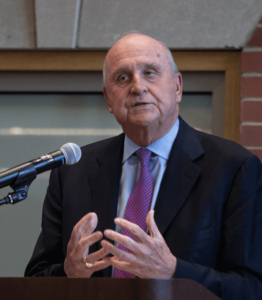Tag: Arthur Ryan
Importance of Liberal Arts Education in Business: Arthur F. Ryan Addresses PC Community at Fiondella Lecture
by The Cowl Editor on October 10, 2019
Campus

by Catherine Brewer ’21
News Staff
What does it take to be one of the youngest presidents of Chase Manhattan Bank and later the CEO of Prudential Insurance Company of America? For Arthur F. Ryan ’63, ’90Hon., & ’89P, it began with a mathematics degree from Providence College.
On Friday, October 4, Ryan delivered the annual Fiondella lecture in the Ryan Center for Business Studies, the building that was named in honor of his donation to the College.
In his Homecoming Weekend address, Ryan discussed how important his liberal arts education has been for him in the business world. Studying humanities taught Ryan what it means “to learn to learn,” which he describes as having the ability to open one’s mind to innovative ideas and to think critically. “It wasn’t only the ability to learn. It was the ability to take that learning and make it happen,” stated Ryan.
He explained that this skill was invaluable to him when he made his first career move after graduation: he joined the military, and after nine weeks in the infantry training school, Ryan was sent to the Army Security Agency where he had the unique opportunity of going to computer school in 1964.
Since computers were a new commodity, Ryan was promoted every three to six months because he had distinct knowledge of the job and ended up managing over 100 employees at only 26 years old. Despite graduating without a business degree, he credits his ability to creatively analyze and find solutions to his PC education.
Ryan went on to become one of the youngest presidents of Chase Manhattan Bank, as well as the first outsider to become the CEO of Prudential Insurance. In this role, he led the company to be publicly traded as Prudential Financial.
In the face of challenges when entering Prudential, Ryan discussed how important it was for him to think back to his humanities education and choose to “do the right thing.”
In a question-and-answer session, former trustee Elizabeth E. Flynn ’82 & ’17Hon. joined Ryan to discuss her experience as his “sponsor” in the business world. “We didn’t call it that back then, but it’s different than a mentor, and it’s far more rare and far more impactful,” said Flynn.
She also described how Ryan took a risk with her by placing her in leadership roles at a time when women were not typically given these opportunities. Flynn went on to become a senior-level executive with 30 years experience in banking, insurance, and risk management.
The Fiondella lecture was established by Robert W. Fiondella ’64, ’16Hon., & ’16GP and Carolyn Fiondella ’16GP. As generous supporters of the College, the Fiondellas have made important contributions to the Great Room in the Ruane Center for the Humanities and the Angel Fund, an emergency support grant that helps students stay in school despite sudden financial challenges.
Fiondella is an alumnus of both the political science and Liberal Arts Honors Programs. Seeing how impactful the humanities education at Providence College was on his life, the Fiondellas founded the Fiondella lecture series in 2017 to bring speakers to campus that demonstrate success in business with a liberal arts education.
They also established the Fiondella Student Academic Achievement Award, which recognizes a student with esteemed accomplishments in humanities and business studies.
This year’s award was given to Nicole Jozwik ’20. Jozwik is a student in the Liberal Arts Honors Program, an art history major, and double minor in Spanish and business innovation.
“I find that the liberal arts offer a fresh perspective to problem-solving in our modern global culture,” wrote Jozwik in a statement that was read by Father Brian J. Shanley, O.P., in his presentation of the award. “In my own study of the humanities, visual arts, and foreign languages, I am able to bring more creativity to the business world. I believe that the current time calls for an interdisciplinary generation to continue our advancement towards an imaginative, progressive future.”
Such advancement is a staple of the liberal arts education that PC aims to provide its students.
